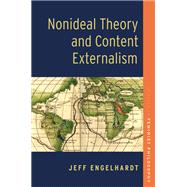Nonideal Theory and Content Externalism
, by Engelhardt, Jeff- ISBN: 9780197754191 | 0197754198
- Cover: Hardcover
- Copyright: 1/24/2024
Jeff Engelhardt is Associate Professor of Philosophy at Dickinson College. Their work appears in Philosophers' Imprint, Australasian Journal of Philosophy, Hypatia, Philosophical Studies, and Feminist Philosophy Quarterly.
Chapter 1 De-idealization, Mind, and Language
0. Introduction
1. De-idealization
1.1 De-idealization and Systemic Oppression
1.2 Identifying Idealizing Assumptions
1.3 De-idealization and Nonideal Theory
2. Objections, Replies, and Clarifications
2.1 Acceptable Idealizations
2.1.1 Simplifications
2.1.2 Exemplars
2.2 Is Idealization Antithetical to the Proper Goal of the Enterprise?
2.3 The Distinction Between Idealized and De-idealized Theories
3. Conclusion
Chapter 2 De-idealizing Objective Type Externalism
0. Introduction
1. Content Externalism
1.1 Natural Kind Externalism
1.2 Objective Type Externalism
1.3 Revising the Three Phases of Determination and Discovery
1.4 Three Explanatory Goals
2. Oppression and the Determination of Type Terms
2.1 Oppression Systematically Influences the Development of Social Kind Terms
2.1.1 Political and Economic Terms
2.1.2 Gender Terms
2.1.3 Race Terms
2.2 Oppression Systematically Influences Research Into Social Kinds
2.2.1 “Intelligent”
2.2.2 Race and Gender Terms 1: 'Sexual Ambiguity'
2.2.3 Race and Gender Terms 2: Sentimentalism
2.2.4 Manifest and Operative Concepts, Dubious Researcher
2.3 Oppression Systematically Influences Responses to Empirical Research
3. The De-idealized Theory Improves Upon Its Predecessor
3.1 Ideal and Nonideal Phases
3.2 The De-idealized Theory is Superior
4. Conclusion
Chapter 3 De-idealizing Social Externalism
0. Introduction
1. Social Externalism
1.1 Motivating Social Externalism
1.2 The Division of Linguistic Labor
1.3 Cognitive Value and Conventional Linguistic Meaning; Terms and Concepts
1.4 Social Externalism's Explanatory Goals
2. Oppression and the Division of Linguistic Labor
2.1 Tools
2.1.1 S-Rules, G-Rules, and Exercitives
2.1.2 Exercitives and Patterns of Semantic Deference
2.2 Corrections
2.3 Ranks
2.4 Enforcement
2.4.1 Enforcing Semantic Deference: Legal Terms
2.4.2 Enforcing Semantic Deference: Dominant Terms
3. The De-idealized Theory Improves Upon Its Predecessor
3.1 Ideal and Nonideal Dialectics
3.2 The De-idealized Theory is Superior
4. Conclusion
Chapter 4 Applications
0. Introduction
1. Epistemic Injustice
2. Externalism and Conceptual Engineering
2.1 Is Externalist Conceptual Engineering Possible?
2.2 Engineering Meaning-making Processes
2.2.1 Can and Should We Engineer Our Meaning-making Processes? And if so, How?
2.2.2 What Would Ideal Meaning-making Processes Be Like?
2.2.3 How Should We Determine Who Determines Meanings?
3. Conclusion
Bibliography
Index
The New copy of this book will include any supplemental materials advertised. Please check the title of the book to determine if it should include any access cards, study guides, lab manuals, CDs, etc.
The Used, Rental and eBook copies of this book are not guaranteed to include any supplemental materials. Typically, only the book itself is included. This is true even if the title states it includes any access cards, study guides, lab manuals, CDs, etc.
Digital License
You are licensing a digital product for a set duration. Durations are set forth in the product description, with "Lifetime" typically meaning five (5) years of online access and permanent download to a supported device. All licenses are non-transferable.
More details can be found here.






